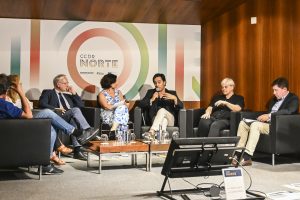
Article written by Raquel de Sousa (INL) on August 04 of 2025
Porto, July 30, 2025 —Over 60 key stakeholders (72% attendance) from the Food & Feed (CSS2) and Plastics & Rubber (CSS4) sectors convened for a regional workshop aimed at integrating stakeholders and build momentum for co-designing practical measures to improve sustainability in industrial and urban waste streams in the Norte Region of Portugal. The event took place in the CCDR-Norte auditorium and brought together representatives from waste management, recycling, manufacturing, research, and public and
In a pre-event survey of 74 registrants, top barriers identified included: Inconsistent waste management (54.1%), Low consumer awareness (31.1%), Financial constraints (27%), Infrastructure gaps (25.7%), Limited technical knowledge (24.3%), and Market access challenges (16.2%)
The event opened with welcoming remarks from Ricardo Simões (CCDR-Norte), who thanked stakeholders for their continued engagement in Frontsh1p events and emphasised the importance of collective action for sustainable and efficient waste management. He noted that these contributions will inform a regional Action Plan and Roadmap. Raquel de Sousa (INL) then contextualized the event within the Frontsh1p project and its replication strategies, followed by Alexandra Pinto (INEGI), who highlighted key figures from APA’s 2022 report: 56.1% of urban waste was landfilled, 13% recycled, and only 1% used for energy recovery.
The roundtable discussions moderated by Manuela Pintado (Portuguese Catholic University) and featuring representatives from Sogrape (Wine Production), Resíduos do Nordeste (Waste Management), Lipor (Metropolitan Area of Porto Waste Association), R3Natura (Plastic Recycling), PIEP (Polymers Innovation Centre), and INESC TEC (Associate Laboratory), identified five strategic opportunities:
- Cork stopper collection and valorisation (relevant to the wine sector)
- Synergies between waste producers and valorisation industries (e.g., biomass from wine production)
- Reimagining waste collection systems (e.g. more adaptive systems based on waste type and frequency)
- Promoting conscious consumption (e.g. to reduce unnecessary waste and pressure on urban infrastructure)
- Attracting Investment in Waste Valorisation (e.g. turning waste into resources and stimulating green jobs)
During the second part of the workshop participants formed five working groups, split by sector and waste type (industrial or urban), to propose actionable strategies, such as:
Food & Feed:
- Creation of dedicated working groups for key value chains
- Improve infrastructure for bio-waste collection and source separation
- Enhance consumer education at household and school levels
Plastics & Rubber:
Policy & Regulation
- Simplified legal and licensing frameworks
- Fiscal incentives for recycled content
Innovation, Infrastructure & Investment
- Promotion of eco-design, reduce use of non-recyclable multi-materials, and material traceability
- Investment in industrial symbiosis platforms and pilot projects
- Strengthen sorting and recovery technologies.
- Fund pilot projects for pre-industrial solutions.
- Identify uncovered waste streams and develop collection systems.
Knowledge & Awareness
- Provide technical training and support for companies.
- Facilitate knowledge transfer across the value chain.
- Raise consumer awareness of circular practices.
From post-event feedback, 17 out of 62 participants provided feedback. For a circular and efficient waste management, first, it is necessary to divert waste from landfill to material valuation and waste to energy, but also to develop specific value chains for specific waste. In line with this, participants identified three key actions that could transform the sector:
- Streamlining regulation and introducing fiscal incentives
- Investment in waste valorisation (material and energy)
- Stronger coordination with public authorities and industrial actors
To track progress, participants proposed the following circularity indicators: Landfill Waste Diversion Rate, Material Circularity Index, and Number of Active Industrial Symbioses.
This workshop reinforced the urgency and opportunity of transforming the Norte Region’s waste systems through collaborative, cross-sectoral action. This event was hosted by the Commission for Coordination and Regional Development of the North (CCDR-Norte), the Institute of Science and Innovation in Mechanical and Industrial Engineering (INEGI), PortugalFoods Association, Smart Waste Portugal Association (ASWP), and the International Iberian Nanotechnology Laboratory (INL).
The Norte Region of Portugal is one of the four replication regions involved in the transition to circular economy within the framework of the FRONTSH1P project (WP8). The outputs will inform a targeted Action Plan and Roadmap to accelerate circular transitions in the Norte Region. We are currently organising the next and last seminar, which will cover the Action Plans developed for both value chains and overall project results for the Norte Region (Portugal) on October 14 at INL, Braga. For more information, please contact: raquel.desousa@inl.int.



